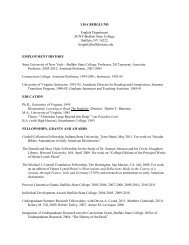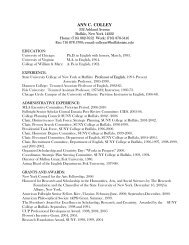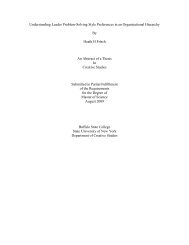POLITICS VERSUS SCIENCE: APPORTIONING ... - Buffalo State
POLITICS VERSUS SCIENCE: APPORTIONING ... - Buffalo State
POLITICS VERSUS SCIENCE: APPORTIONING ... - Buffalo State
Create successful ePaper yourself
Turn your PDF publications into a flip-book with our unique Google optimized e-Paper software.
food regime. The EFSA’s Advisory Forum is a body of representatives of Member<br />
<strong>State</strong>s’ food safety authorities, while scientists staff its Scientific Committee and Panels.<br />
The latter is advisory rather than regulatory. The regulatory function is carried out by the<br />
Commission’s Standing Committee on the Food Chain and Animal Health.<br />
<br />
The expectation of EFSA as part of a "vast network" of experts and decision-<br />
makers, brings us to our third question: how can we evaluate food safety policy within<br />
the broader framework of regulatory governance in the European Union?<br />
The European Commission has long cultivated policy networks to coordinate the single<br />
market, an alternative to the independent regulatory authorities found in many federal<br />
systems. The European Food and Safety Authority (EFSA) is at the center of a network<br />
of Member <strong>State</strong> regulatory bodies to exchange and disseminate scientific assessment of<br />
food safety. The EFSA, at the same time, belongs to the Commission’s network<br />
organized to manage risk and communicate risk measures. 16<br />
The European food safety regime offers an opportunity to examine the 1) the<br />
Commission’s coordination and management of a critical policy area 17 and 2) an<br />
independent body’s development, implementation, and coordination of a network for<br />
food safety assessment. The EFSA is expected to resolve a longstanding problem,<br />
namely, to reconcile disparate risk assessments among Member <strong>State</strong>s, which can either<br />
16 “The Commission remains fully responsible for communicating risk management measures. The<br />
appropriate information should therefore be exchanged between the Authority and the Commission.”<br />
(Commission 2002a: 5). With regard to the rapid alert system: “A system for rapid alert already exists in<br />
the framework of Council Directive 92/59/EEC of 29 June 1982…The revised system should be managed<br />
by the Commission and include as members of the network the Member <strong>State</strong>s, the Commission and the<br />
Authority.” (Commission 2002a: 5).<br />
17 Critical because it is straddles low (economics) and high (security of citizens) politics.<br />
24












